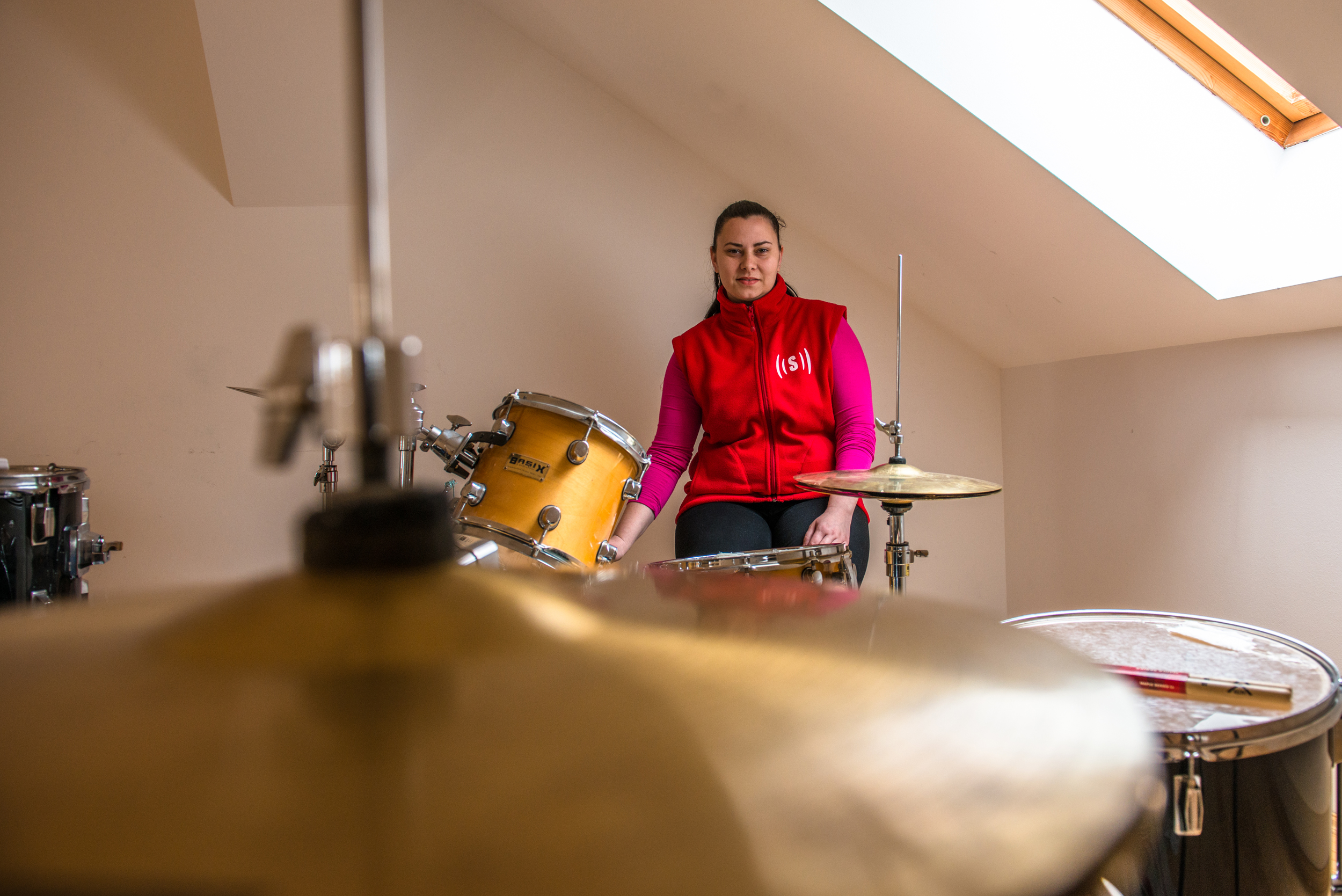In the cheerful space of the new music school, festooned with balloons and drawings, the children of Srebrenica, all neatly dressed, sing the anthem of Bosnia and Herzegovina: “la, la, la, la, la, la, la”.
There, singing together in the same choir, are the children and grandchildren of both the belligerents and the beleaguered.
The girls have put on make-up, trying to look older and like the singers they see on TV. The younger ones have sprinkled stars and glitter on their faces. Parents are jostling about, trying to take as good a picture as possible and to get a better look. “La, la, la, la”.
Our national anthem has no lyrics*.
For those who do not know what happened in Srebrenica, and there are no such people in the audience, perhaps the only suspicious thing might be the “la, la, la, la, la, la, la, la”, instead of the words of the anthem.
A boy named Ranko hosts the program. He announces the following composition: “Besame Mucho, played by Ranko Milosavljević on the clarinet.” He pauses for a moment.
“Oh, that would be me!” says Ranko.
The audience laughs.
The trick worked: it is liberating to forget one’s own name.
•
Come to the party, I tell Hasan.
I’m not into parties.
Come on, Hasan, come, I say encouragingly. Hasan survived the Srebrenica genocide. That was 20 years ago.
No, I won’t come, I’d spoil the mood.
You won’t spoil anybody’s mood. Everybody will have a good time. It’s the Festival. Summer. Sarajevo.
When people see me, they think of Srebrenica and I spoil the fun.
But you’re not just Srebrenica.
I’ve experienced it a hundred times: people are having fun, and then they see me… I make them feel awkward.
So what? Let them learn that you have a right to enjoy and laugh. Come, please come.
The party has started. Hasan is not there.
•

Hilda does not play drums, but she loves music and what music brings to this small town. She works at the House of Good Tunes that hosts Superar, an initiative inviting young people to experience the importance and beauty of making music together. Through music and friendship they improve their key life skills: self-confidence, respect, discipline, a sense of community, and a sense of responsibility. Photo: © Dejan Petrović
This year a group from Srebrenica travelled to the Netherlands to mark Holocaust Memorial Day. Ramiza lost her husband, father, brother, grandfather, three uncles; Muška lost two children, a husband, father-in-law, brother-in-law, six nephews, an uncle; Nura lost her underage son, husband, father-in-law and sixteen family members; Fatima lost her three children…
They visit the Westerbork Memorial Center.
As part of the commemoration, the organizer asks them, the way they do it there, to read out the names of the victims and their age.
The women take the list of names and stumble over the words:
Ina Speer, zeven jaar
Isaac Speer, achtenzeventig jaar
Isaac van Speer, zeventien jaar
Isaac van Speer, vier jaar
Isaac Elias van Speer, drieendertig jaar
Isaac van Speer, achtendertig jaar
Isaac van Speer, dertig jaar
Isaac Abraham van Speer, tweeendertig jaar
Izaac Speer, drieen-zeventig jaar
Jakob Speer, dertig jaar
They have trouble with the pronunciation. Their tongues slip to the side, they cannot put two letters together.
Muška starts laughing secretly.
The women, some of whom have only finished grade school, who before the war had never travelled beyond their village, who do not speak any foreign language, read the Dutch and to them it looks like a macadam road full of ruts just waiting to trip them up. They break out in a sweat. The situation is somber, tense, but the words are ticklish.
They try to stifle the laughter that is shaking their bodies. They do not dare to look at one another or they will explode. They are embarrassed. In each name they see their own child, husband, father, brother. But they are almost crying with laughter. They try for it not to show in their voices, but the laughter keeps breaking through.
2 May 2015
* Because the national parties in power were unable to reach a political agreement, none of the proposed lyrics for the national anthem were adopted. As a result, since the war the anthem of Bosnia and Herzegovina has had no lyrics.
In 2015, this text was published as part of the exhibition and publication project SREBRENICA TODAY, which was initiated on the occasion of the commemoration of the 20th anniversary of the Srebrenica genocide and the signing of the Dayton Agreement and shown on 11 July at the Srebrenica-Potočari Memorial Center as part of the official commemoration ceremony.
Srebrenica today
Publisher: ERSTE Foundation, 2015
Editor: Christiane Erharter
Photographs by Dejan Petrović
Texts by Boris Buden, Erhard Busek, Slavenka Drakulić, Doraja Eberle, Haris Pašović, Bojana Pejić, Wolfgang Petritsch, Jasmila Žbanić
Supported by Doraja Eberle in cooperation with “Bauern helfen Bauern” – Bratunac
The exhibition was also displayed in the premises of ERSTE Foundation in Vienna, at the Cultural Center Parobrod in Belgrade, at the European Forum Alpbach, and, in 2016, in Philantropy House in Brussels. Twenty years after the genocide SREBRENICA TODAY was a visual portrait of the town and its residents showing moments of everyday life in the town of Srebrenica and its surroundings.
The exhibition was comprised of eight posters. Each of them featured photo-portraits of the residents, their everyday life or professional activities. These portraits were combined with texts by personalities from the fields of politics, arts and culture.